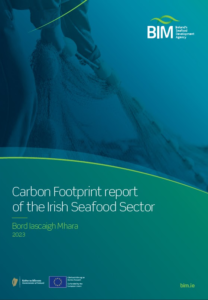- First of its kind study for the Irish seafood sector is a commitment of the Government Climate Action Plan and provides an important baseline for Irish seafood industry
- Irish seafood has among the lowest emissions of all food production in Ireland
A new study by Bord Iascaigh Mhara (BIM) – the State agency that supports development of the seafood sector in Ireland – has found that Irish produced seafood is among the lowest carbon food produced in Ireland. This study provides the Irish seafood sector with access to reliable data for the first time. It identifies areas for targeted strategies to help minimise the carbon emissions associated with the production of seafood.
The Carbon Footprint Report of the Irish Seafood Sector found that carbon emissions for the sector are just under 400,000 tonnes of CO2 – less than 2% of those produced in other key food sectors. This number includes the emissions for both farmed and wild caught seafood. Farmed mussels (rope grown), oysters and wild caught mackerel in particular have been shown to have very low carbon emissions.
Caroline Bocquel, BIM Chief Executive Officer welcomed the newly published report. Speaking from the Irish Skipper Expo in Limerick – a trade show event for the fishing industry that BIM sponsors – she said it provided scientific evidence that the sector has significantly low levels of greenhouse gas emissions:
“Access to reliable data is crucial to understand which steps of seafood production create the most emissions. Being able to feed people in a healthy, nutritious, and equitable way, without adding to global warming, is key.
This comprehensive study has taken almost two years to complete. Delivering the data required input from industry and other stakeholders. The findings of the report demonstrate how the sector is producing a beneficial , nutritious, and safe food with low environmental impacts.”
“In fishing, fuel accounts for more than 90% ofcarbon emissions, while processing and transportation accounts for 10% of the emissions. Already, we are seeing transitions away from exclusively diesel-powered engines to hybrid vessels and alternative fuels are also being explored. Later this year BIM will produce a report under the Climate Action Plan 2023 on the role these alternative fuels may play in the future of the Irish seafood sector. We now have a great opportunity to reduce emissions even further.”
The seafood sector and Brexit adjustment
The Irish fishing sector has faced significant challenges in recent years, including the closure of markets due to the COVID-19 pandemic and the ongoing impact of Brexit. The Government’s Seafood Taskforce – which included seafood representative organisations – produced a set of recommendations in its final report. These include business supports, funding for capital projects and development of skills to allow seafood businesses to build or adapt their operating models. It also extends to other businesses in coastal communities, to help ensure these are sustainable.
BIM is currently administering schemes with a total value of €265m under the Brexit Adjustment Reserve (BAR) delivering on the recommendations of the Seafood Taskforce. The aim of all schemes is to develop and restructure the sector, ensuring a profitable and sustainable seafood industry providing jobs and economic activity in coastal communities dependent on fishing.
A Decommissioning Scheme for whitefish vessels – similar to one initiated in 2008 – was one of the central recommendations of the taskforce to mitigate the impact of quota transfers from the EU to the UK, that resulted from Brexit, and ensure a viable industry could remain in place. The closing date for the scheme’s acceptance of offers is next month, March 2. 57 letters of offer have been issued with total funding of €75 million. To date 20 owners have accepted.
A €45M Seafood Processors Scheme – for improvements and innovation in seafood processing – has received a good response. To date, 21 projects of significant size have been approved, totalling some €22M.
The €25M Brexit Blue Economy Enterprise Scheme seeks to rejuvenate businesses in coastal communities around Ireland, helping them to adapt, restructure and reskill in the post Brexit landscape. BIM has received hundreds of applications to date. Everything ranging from mobile seafood trucks to sea salt businesses have successfully applied for funding, and more than €3.5M in grant funding has been approved to date.
“The seafood sector has shown immense resilience and strength in its ability to adapt to changing marketplaces and socio-political impacts. BIM is working closely with industry and other stakeholders to develop supports that allow businesses to be agile and take advantage of new market opportunities,” said Caroline Bocquel.
“Coupled with the fact that seafood has one of the lowest carbon footprints of any food produced in Ireland, this paves the way for a sustainable future for the sector.”
Download the Carbon Footprint report of the Irish Seafood Sector here


